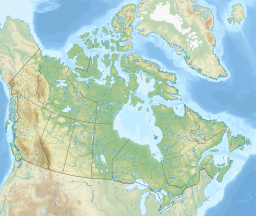Emma Lake (Saskatchewan)
 From Wikipedia the free encyclopedia
From Wikipedia the free encyclopedia
| Emma Lake | |
|---|---|
 Emma Lake | |
| Location | Lakeland No. 521, Saskatchewan |
| Coordinates | 53°36′35″N 105°54′50″W / 53.60972°N 105.91389°W |
| Type | Lake |
| Part of | Saskatchewan River drainage basin |
| Primary inflows | Montreal Creek, Emma Lake Diversion |
| Primary outflows | Christopher Lake diversion |
| Catchment area | 161 km2 (62 sq mi) |
| Basin countries | Canada |
| Surface area | 1,874 ha (4,630 acres) |
| Max. depth | 10.1 m (33 ft) |
| Shore length1 | 66.9 km (41.6 mi) |
| Surface elevation | 516 m (1,693 ft) |
| Islands |
|
| Settlements | Emma Lake |
| 1 Shore length is not a well-defined measure. | |
Emma Lake[1] is a recreational lake in the Canadian province of Saskatchewan. It is located near the southern limit of the boreal forest, about 45 kilometres (28 mi) north of Prince Albert. The lake is within the District of Lakeland No. 521 and east of Prince Albert National Park.[2] There are several small communities and recreational opportunities around Emma Lake and much of the northern half is within Great Blue Heron Provincial Park.[3] Access to the lakes is from Highways 953, 952, and 263.
Description
[edit]Emma Lake is in the Spruce River drainage basin. The Spruce River is a tributary of the North Saskatchewan River. The lake consists of three main sections that are connected by narrow straits. The northern section is mostly within Great Blue Heron Provincial Park and includes Fairy Island Wildlife Refuge (53°37′07″N 105°56′47″W / 53.6187°N 105.9463°W)[4] and the small community of Okema Beach. Cattle Island separates the northern section from the central one and Murray Point and McPhail Cove are found there. The strait at McIntosh Point separates the central section from the southern one. The southern section consists of Munsons and Sunset Bays and numerous communities, including Neis Beach, Emma Lake, Guise Beach, and Sunnyside Beach.[5] Montreal Creek[6] is the primary natural inflow while Emma Lake diversion from Anglin Lake is the greatest by volume inflow.[7] Prior to the completion of the diversion, neither Emma nor neighbouring Christopher Lake were connected to the Spruce River.
Emma Lake diversion
[edit]Anglin, Emma, and Christopher Lakes historically have experienced extreme variations in seasonal water levels. To help alleviate this, with the construction of Spruce River Dam in 1960, the Emma Lake diversion was constructed from Anglin Lake to Emma Lake. The 10-kilometre diversion channel begins at a pumphouse about one kilometre north-east of Spruce River Dam on Anglin Lake. Water is lifted up eight metres at a maximum rate of .65 m3 (23 cu ft) per second through a 284-metre pipeline into Gladys Lake. From there, the water uses gravity to travel through ditches, natural channels, and Blanche and Mae Lakes en route to the northern end of Emma Lake. The diversion channel went into operation on 23 June 1961 and, within a few years, Emma Lake water levels rose 1.8 m (5 ft 11 in) above 1960 levels. Annually, about 3,000 dam3 (110,000,000 cu ft) is pumped into Emma Lake.[8][9]

The Emma Lake diversion project also included the construction of the Christopher Lake diversion. The first part of the Christopher Lake diversion is a short channel connects Emma Lake near Neis Beach to Christopher Lake at Clearsand Beach. The diversion opened in 1965 and, a few years later, water levels in Christopher Lake rose 2.2 metres from 1960 levels. Controlling the outflow from Emma Lake is a .90 m (2 ft 11 in) grated culvert control structure through Highway 953. At the southern end of Christopher Lake is the second part of the Christopher Lake diversion project. It was the final phase of the diversion project and it involved constructing the lake's outflow at Christopher Creek. Christopher Creek[10] is a partially natural run and partially constructed channel that flows south from Christopher Lake near the village of Christopher Lake to the Spruce River south of the Little Red River Indian Reserve. Water flowing into Christopher Creek is controlled by a two-bay log-stop structure which controls flow into two 1.07 m (3 ft 6 in) culverts. The structure allows drawdown of both Emma and Christopher Lakes simultaneously.[11] This final phase of the project wasn't completed until 1975.
Fish species
[edit]Fish commonly found in the lake include walleye, northern pike, white sucker, and yellow perch.[12][13]
See also
[edit]References
[edit]- ^ "Emma Lake". Canadian Geographical Names Database. Government of Canada. Retrieved 17 August 2022.
- ^ "Lakeland District". Lakeland 521. Lakeland 521. Retrieved 22 August 2022.
- ^ "Great Blue Heron Provincial Park". Tourism Saskatchewan. Government of Saskatchewan. Retrieved 23 August 2022.
- ^ "Fairy Island Wildlife Refuge". Canadian Geographical Names Database. Government of Canada. Retrieved 7 March 2024.
- ^ "Emma Lake". Geoview. Retrieved 22 August 2022.
- ^ "Montreal Creek". Canadian Geographical Names Database. Government of Canada. Retrieved 20 August 2022.
- ^ "Emma Lake Fishing Map". GPS Nauticals. Bist LLC. Retrieved 22 August 2022.
- ^ "Water Conveyance & Flood Controls". Water Security Agency. Water Security Agency. Retrieved 24 August 2022.
- ^ "Spruce River Diversion to Emma Lake".
- ^ "Christopher Creek". Canadian Geographical Names Database. Government of Canada. Retrieved 25 August 2022.
- ^ "Management of Spruce River Diversion Project Anglin / Emma / Christopher Lakes" (PDF). Lakeland 521. Saskatchewan Watershed Authority. Retrieved 24 August 2022.
- ^ "Fishing in Emma Lake". Fishbrain. Retrieved 20 August 2022.
- ^ "Emma Lake". Angler's Atlas. Angler's Atlas. Retrieved 22 August 2022.

